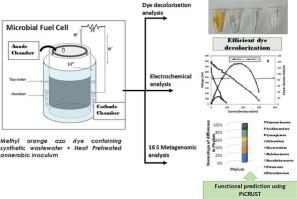微生物燃料电池阳极接种物热预处理对甲基橙染料降解及发电的影响
IF 7
2区 工程技术
Q1 ENERGY & FUELS
Sustainable Energy Technologies and Assessments
Pub Date : 2025-08-19
DOI:10.1016/j.seta.2025.104525
引用次数: 0
摘要
微生物燃料电池(mfc)因能有效脱色甲基橙(MO)染料(一种对环境有重大影响的合成偶氮染料),同时产生绿色电力而受到广泛关注。然而,在处理和发电方面,mfc的效率受到厌氧接种物中存在的微生物联合体产甲烷所造成的底物损失的限制。本研究旨在评价热预处理策略抑制产甲烷菌的效果,以及如何通过提高MFC的外电活性来有效地脱色甲基橙染料。采用热处理污泥(MFC-1)的MFC在单级4小时内就能完全去除100%的MO,最大发电量达到134 mW/m2。对预处理和未处理接种物的微生物谱分析结果显示,MFC-1中Proteobacteria的丰度显著高于MFC-1,而MFC-2中Proteobacteria的丰度高于MFC-1。结果表明,在100℃下对污泥进行15分钟的热处理是一种很有前途的策略,可以实现废水中高速率的MO去除,同时保持更高的功率回收率。利用宏基因组数据进行功能性状预测,揭示了MFC系统中存在潜在的酶和代谢途径。本文章由计算机程序翻译,如有差异,请以英文原文为准。

Effect of heat pretreatment of anodic inoculum in microbial fuel cell for enhanced methyl orange dye degradation and electricity generation
Microbial fuel cells (MFCs) have gained remarkable attention for effectively decolorizing Methyl orange (MO) dye—a synthetic azo dye with a significant environment concern, while generating green electricity. However, the efficiency of MFCs, both in terms of treatment and power generation, is limited by substrate loss due to methanogenesis in the microbial consortium present in the anaerobic inoculum. The present study designed to evaluate the efficiency of heat pre-treatment strategy to suppress the methanogens and how effectively decolorize methyl orange dye by enhancing the exoelectrogens activity of MFC. The MFC using heat pretreated sludge (MFC-1) demonstrates a complete MO removal of 100 % within just 4 h in a single stage, achieving a maximum power generation of 134 mW/m2. The microbial profile analysis of pre-treated and untreated inoculum showed significant results with an abundance of Proteobacteria in MFC-1 whereas the Proteobacteria abundant in MFC-2 than the MFC-1. The results demonstrate heat treatment of sludge at 100 ℃ for 15 min as a promising strategy to achieve high-rate MO removal from wastewater while maintaining an enhanced power recovery. The functional traits prediction using the metagenome data reveals the presence of potential enzymes and metabolic pathways within the system of MFC.
求助全文
通过发布文献求助,成功后即可免费获取论文全文。
去求助
来源期刊

Sustainable Energy Technologies and Assessments
Energy-Renewable Energy, Sustainability and the Environment
CiteScore
12.70
自引率
12.50%
发文量
1091
期刊介绍:
Encouraging a transition to a sustainable energy future is imperative for our world. Technologies that enable this shift in various sectors like transportation, heating, and power systems are of utmost importance. Sustainable Energy Technologies and Assessments welcomes papers focusing on a range of aspects and levels of technological advancements in energy generation and utilization. The aim is to reduce the negative environmental impact associated with energy production and consumption, spanning from laboratory experiments to real-world applications in the commercial sector.
 求助内容:
求助内容: 应助结果提醒方式:
应助结果提醒方式:


